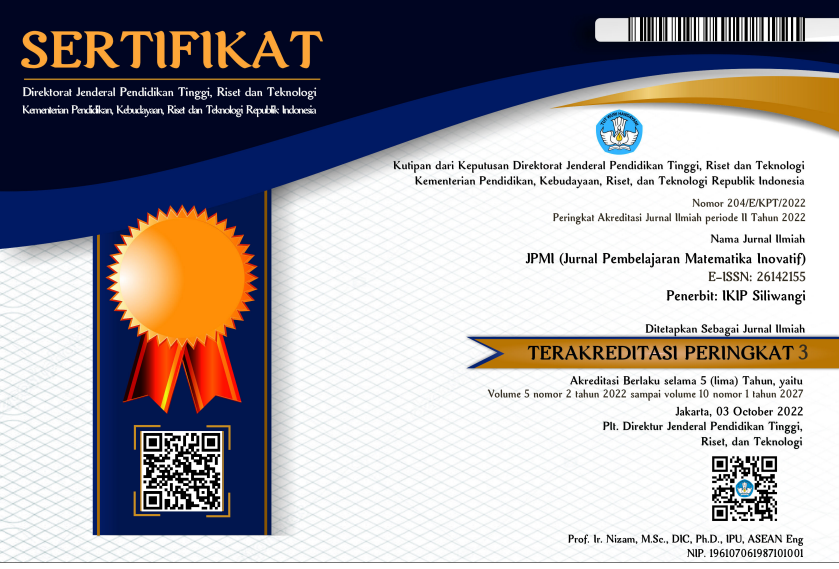Pembelajaran problem based learning (PBL) dengan kerangka kerja TPaCK: kemampuan pemecahan masalah matematis siswa SMA
DOI:
https://doi.org/10.22460/jpmi.v6i5.15834Keywords:
Problem Based Learning (PBL), TPaCK, Problem-Solving AbilitiesAbstract
This research was conducted to investigate the influence of PBL (Problem-Based Learning) with the TPaCK framework on the mathematical problem-solving abilities of high school students, specifically focusing on the topic of Systems of Linear Equations with Three Variables (SPLTV). The study employed a pre-experimental design using a one-group pretest-posttest approach at a public high school in Kabupaten Serang with Class X IPA 6 as the selected research sample. The participants were chosen through purposive sampling during the first semester of the academic year 2022–2023. Data collection in this study involved pre-tests and post-tests. The data obtained from the initial and final tests was then processed through three stages, namely descriptive data analysis, data prerequisite test, and hypothesis test The findings of this research demonstrate that PBL with the TPaCK framework can enhance the mathematical problem-solving abilities of high school students.
References
Alan, U. F., & Afriansyah, E. A. (2017). Kemampuan pemahaman matematis siswa melalui model pembelajaran auditory intellectualy repetition dan problem based learning. Jurnal Pendidikan Matematika, 11(1). 67 - 78. https://doi.org/10.22342/jpm.11.1.3890.67-78
Amallia, N., & Unaenah, E. (2018). Analisis kesulitan belajar matematika pada siswa kelas III sekolah dasar. Attadib: Journal of Elementary Education, 2(2), 123–133.
Arbianto, U. F., Widiyanti, W., & Nurhadi, D. (2019). Kesiapan technological, pedagogical and content knowledge (tpack) calon guru bidang teknik di universitas negeri malang. Jurnal Teknik Mesin Dan Pembelajaran, 1(2), 1–9.
Fauzy, A., & Nurfauziah, P. (2021). Kesulitan pembelajaran daring matematika pada masa pandemi COVID-19 di SMP Muslimin Cililin. Jurnal Cendekia: Jurnal Pendidikan Matematika, 5(1), 551–561.
Fitria, D. (2021). Kemampuan pemecahan masalah matematis siswa sma negeri kota tangerang selatan pada materi sistem persamaan linear tiga variabel (Issue 11170170000004).
Haqiqi, A. K., & Syarifa, S. N. (2021). Keefektifan model problem based learning berbantuan video dalam liveworksheets terhadap kemampuan pemecahan masalah matematis siswa. Jurnal Pendidikan Matematika (Kudus), 4(2), 193-210. https://doi.org/10.21043/jmtk.v4i2.12048
Herliandry, L. D., Nurhasanah, N., Suban, M. E., & Kuswanto, H. (2020). Pembelajaran pada masa pandemi covid-19. JTP-Jurnal Teknologi Pendidikan, 22(1), 65–70.
Istiqomah, N., & Siswono, T. Y. E. (2020). Pengaruh pembelajaran problem based learning terhadap kemampuan metakognitif dan pemecahan masalah matematika di kelas xi sma negeri 1 jombang. MATHEdunesa, 9(2), 422–429. https://doi.org/10.26740/mathedunesa.v9n2.p422-429
Keengwe, J., Onchwari, G., & Onchwari, J. (2009). Technology and student learning : toward a learner- centered teaching model. Technology, 17(1), 11–22. http://www.editlib.org/p/26258
Maharani, E., Bukit, N., dan Sinulingga, K. (2017). Efek model problem based learning terhadap kemampuan pemecahan masalah dan berpikir kritis pada sekolah menengah pertama. Jurnaal Pendidikan Fisika, 6(2), 81–86.
Putria, H., Maula, L. H., & Uswatun, D. A. (2020). Analisis proses pembelajaran dalam jaringan (daring) masa pandemi covid-19 pada guru sekolah dasar. Jurnal Basicedu, 4(4), 861–870.
Rosiyanti, H., Ratnaningsih, D. A., Bahar, H., Iswan, & Faisal. (2021). Application of mathematical problem solving sheets in polya’s learning strategy in social arithmetic material. International Journal of Early Childhood Special Education, 13(2), 707–717. https://doi.org/10.9756/INT-JECSE/V13I2.211111
Saputra, B., & Chaeruman, U. A. (2022). Technological pedagogical and content knowledge (tpack): analysis in design selection and data analysis techniques in high school. International Journal of Instruction, 15(4), 777–796. https://doi.org/10.29333/iji.2022.15442a
Setiani, A., Lukman, H. S., & Suningsih, S. (2020). Meningkatan kemampuan pemecahan masalah matematis menggunakan strategi problem based learning berbantuan mind mapping. Prisma, 9(2), 128-135. https://doi.org/10.35194/jp.v9i2.958
Sugiyono. (2018). Metode penelitian pendidikan (Pendekatan Kuantitatif, Kualitatif, dan R&D). Alfabeta.
Sumaji, Sa’Dijah, C., Susiswo, & Sisworo. (2020). Mathematical communication process of junior high school students in solving problems based on APOS theory. Journal for the Education of Gifted Young Scientists, 8(1), 197–221. https://doi.org/10.17478/jegys.652055
Tanjung, S., Baharuddin, Ampera, D., Farihah, & Jahidin, I. (2022). Problem based learning (pbl) model with technological, pedagogical, and content knowledge (tpack) approach. International Journal of Education in Mathematics, Science and Technology, 10(3), 740–752. https://doi.org/10.46328/ijemst.2510
Ubaidillah, Z. (2022). Pengaruh model pembelajaran problem based learning terhadap kemampuan pemecahan masalah matematis. Jurnal Pendidikan Sains Dan Komputer, 2(02), 389–395. https://doi.org/10.47709/jpsk.v2i02.1792
Uliyandari, M., Emilia Candrawati, Anna Ayu Herawati, & Nurlia Latipah. (2021). Problem-based learning to improve concept understanding and critical thinking ability of science education undergraduate students. IJORER : International Journal of Recent Educational Research, 2(1), 65–72. https://doi.org/10.46245/ijorer.v2i1.56
Yunitasari, I., Sahrudin, A., Kartasasmita, B. G., & Prakoso, T. B. (2019). Pengembangan bahan ajar matematika dengan memanfaatkan program geogebra untuk meningkatkan pemahaman konsep dan kemandirian belajar siswa pada pokok bahasan bangun ruang sisi datar. Journal of Mathematics Learning, 2(2), 1–11.
Downloads
Published
Issue
Section
License
Copyright (c) 2023 JPMI (Jurnal Pembelajaran Matematika Inovatif)

This work is licensed under a Creative Commons Attribution-ShareAlike 4.0 International License.
The author is responsible for acquiring the permission(s) to reproduce any copyrighted figures, tables, data, or text that are being used in the submitted paper. Authors should note that text quotations of more than 250 words from a published or copyrighted work will require grant of permission from the original publisher to reprint. The written permission letter(s) must be submitted together with the manuscript.
















